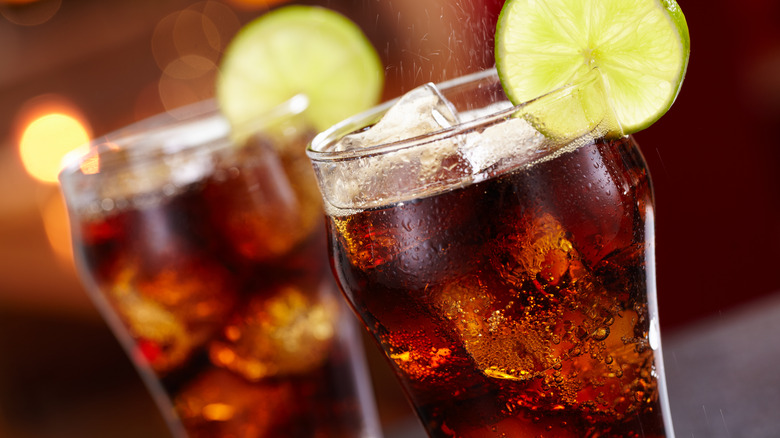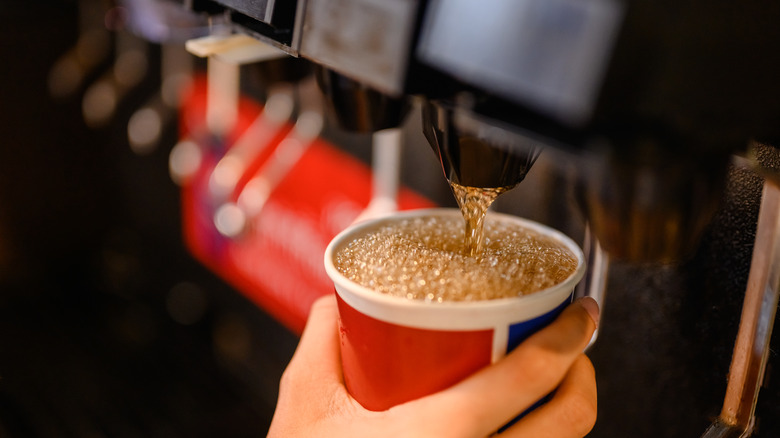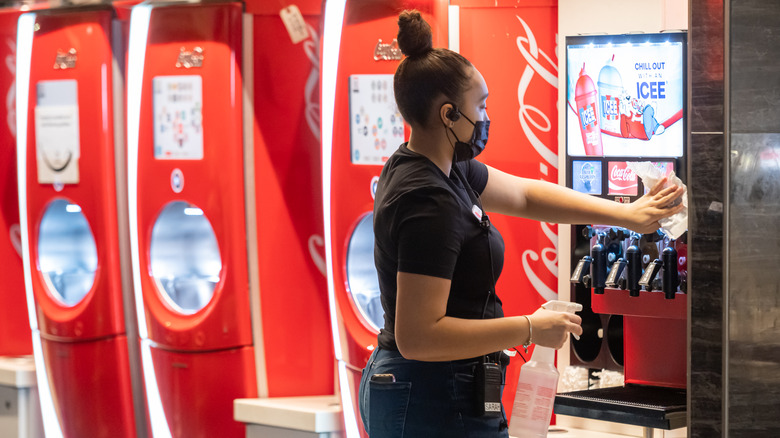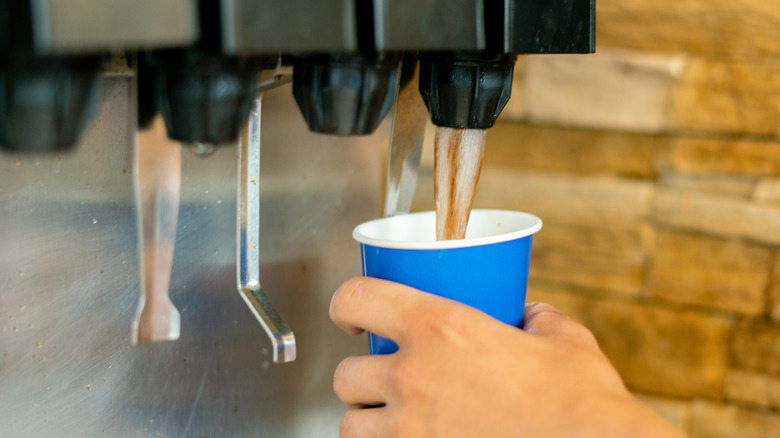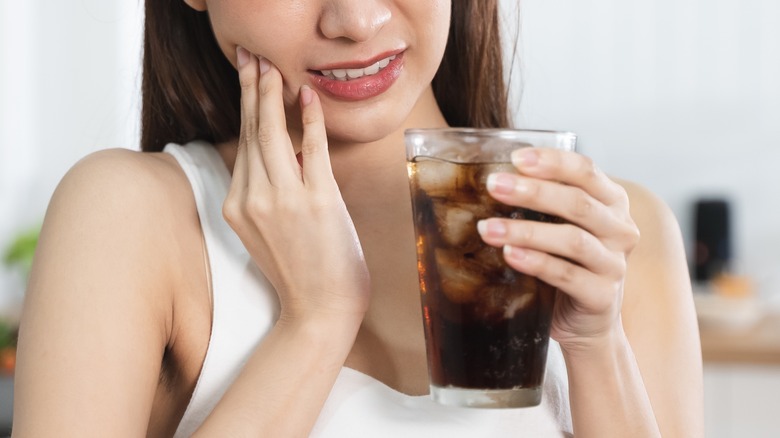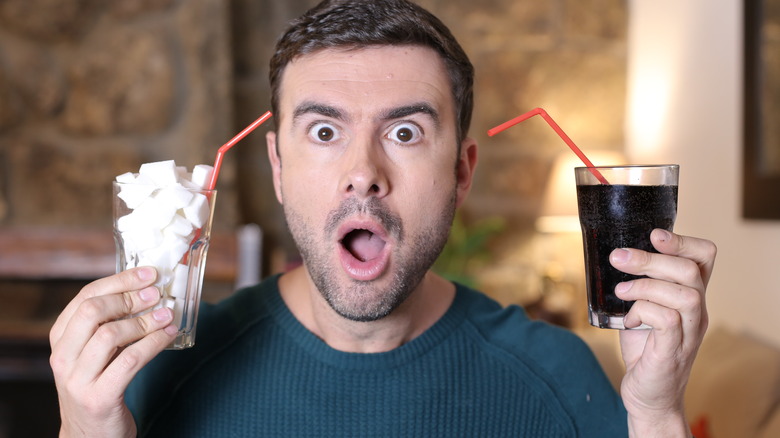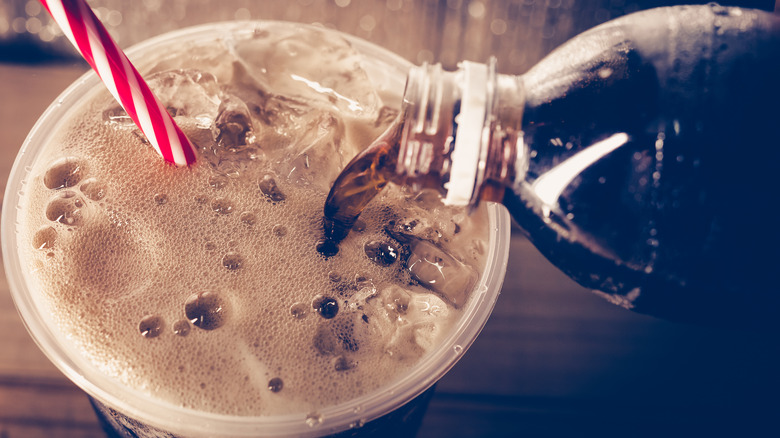Think Twice Before Ordering A Soft Drink When Eating Out
It's no secret that soft drinks can really hit the spot. The origins of soda date back to the 1670s as a way to give the upper crust a pleasant and flavorful non-alcoholic beverage. Over time, these delicious, sugar-filled drinks became known as a satisfying alternative to ... well, "something stronger." As a result, they earned the name "soft drinks" — in other words, the opposite of "hard liquor" — to encourage people to enjoy tasty yet alcohol-free beverages.
Of course, these historic attempts to advertise sodas as if they were all healthier than, say, a glass of wine, at times proved erroneous. The most obvious example of this occurred in one of the earlier versions of Coca-Cola, which included coca leaves in its secret formula. Indeed, back in the 1800s, many patrons sipped soda as a refreshing alternative to wine and beer. As they enjoyed their refreshing soft drinks, however, these consumers had no idea that they were actually partaking in a dangerous drug.
Luckily, Coca-Cola has long since changed its recipe. However, soft drinks continue to pose health concerns for Americans — even in the 21st century. From bug outbreaks in distribution machines to sugar content that exceeds the government-recommended amounts, soft drinks are, unfortunately, still not the best choice. You might even think twice before ordering one at a restaurant.
Some soft drink machines have been infested by bugs
When you go to a restaurant and head over to the soft drink machine, what do you see? You might notice the machine's apparently pristine condition and shiny plastic exterior. You probably eye the row of bright brand names, marking which handle is which. However, you likely don't see an enormous swarm of cockroaches crawling out of the machine.
While this scenario might sound like it came right out of a horror movie, it is — unfortunately — not always so far from reality. Writing for Thought Catalog, former New York City restaurant employee Rob Gunther recalled finding critters crawling inside the soft drink machine at the establishment where he once worked. Gunther explained: "Right underneath the surface of what looked like such an inviting piece of machinery was one of the grossest things I'd ever seen: dozens upon dozens of cockroaches, little medium-sized ones, frightened by the sudden exposure to light, running around in ribbons of brown as they made a desperate attempt to slink back into the shadows."
Apparently, the roach outbreak in Gunther's former restaurant was caused by a syrup leak, which drew the insects into the machine. And, while he wrote that he hoped other restaurants did a better job maintaining certain standards, Gunther hinted that he was not so confident that they always did so. Ultimately, it's better to be safe than sorry, so avoiding soft drinks at restaurants might be a good idea.
Others have had issues with mold
While cockroaches alone are an excellent reason to avoid ordering soft drinks at restaurants, they are hardly the only health hazard that has been found in distribution machines. Mold has also been known to appear in these devices. In 2017, a report by Fox 4 found that the Florida Department of Health had discovered mold in several soft drink dispensers throughout the southwestern part of the state. Apparently, one eatery was found to have an "accumulation of black green mold found around the soda dispensing nozzles" — a clear violation of regional health laws.
Although this might sound like a one-off thing, the presence of mold in soft drink dispensers is a very real problem. In fact, a 2018 investigation by ABC Action News sent Scripps journalists to five separate soda machines at five different locations: a gas station, a movie theater, a fast food restaurant, a casual restaurant, and a hospital. Each of these dispensers was swabbed and tested for different kinds of plant life and bacteria.
In the end, all five of the machines that were tested had some level of mold present in the nozzle. Perhaps unsurprisingly, the hospital's soft drink dispenser contained the lowest levels of contaminants. Meanwhile, the fast food restaurant had, by far, the highest levels. Ultimately, the fact that any amount of mold exists in these machines is reason enough to steer clear of soft drinks.
Unclean soda machines could cause food poisoning
The idea of cockroaches or mold in one's soda might not be particularly appealing. But there are even more health hazards that are fairly common in soft drink dispensers — many of which can cause food poisoning. In 2010, Professor Renee D. Godard and her team at Hollins University published the results of an investigation which found dangerous bacteria on soda dispensers across Roanoke Valley. Food Safety News reported that this study, which appeared in the International Journal of Food Microbiology, found that a whopping 48% of these machines contained coliform bacteria, a is type of fecal bacteria that should never be ingested.
To make matters worse, the study also found that much of the coliform found in the soft drink machines was resistant to antibiotics. In fact, most samples were resistant to at least one of the 11 antibiotics that Godard's team tested.
As a result of these findings, the Hollins University team was alarmed about the cleanliness of local soda dispensers. Professor Godard even noted the possibility of restaurant-goers contracting foodborne illnesses from their soft drinks. According to the Food Safety News report, the researcher put it simply: "There isn't any major food borne outbreak, but soda fountain beverages could be linked to gastrointestinal upset that could go unreported. It's simply that some bacteria may potentially cause some disease or gastroenteritis distress." In other words, enjoying soft drinks at restaurants could literally make you sick.
Most soft drinks are bad for your teeth
Beyond giving you some kind of immediate illness, soft drinks can also cause long-term health issues — especially when it comes to your death. As explained by the Massachusetts Dental Society, soft drinks can actually cause your teeth to rot. The reason for this is that most iced teas, sodas, and juices contain such high levels of sugar that they prompt the bacteria in your mouth to release a special kind of acid. This acid can break down the enamel of your pearly whites. And, over time, this process can lead to cavities or even full-blown tooth decay.
Interestingly, some people might believe that they are preventing this problem by reaching for sugar-free soft drinks rather than their sugary alternatives. Sadly, though, this is not enough to keep your teeth safe from the negative impact of soft drinks. In reality, many sugar substitutes, like aspartame, have a high acid content in and of themselves. This means that diet sodas, iced teas, and even artificially sweetened juices contain so much acid that they pose a risk to your teeth, anyways. As the Massachusetts Dental Society pointed out, these beverages can cause enamel breakdown in your teeth.
As a result, experts recommend restaurant-goers trade in soft drinks for bottled water. While this clear liquid may not taste as scrumptious as, say, a Coke, it offers other benefits for your whole body — including your smile.
They can lead to other health issues
Your teeth are not the only part of your body that could be harmed by the high sugar content of most soft drinks. In fact, many of your internal organs can also suffer if you drink too many of these ultra-sweet beverages. According to the recommendations outlined by the American Heart Association, men should only consume around 36 grams of sugar per day. Women, meanwhile, should have just 25. Nonetheless, a single can of Coca-Cola contains a whopping 34 grams of sugar — more than what half the population should consume within a full 24 hours!
This means that drinking just a few sodas per week can be disastrous for one's health. As explained by the American Heart Association, eating too much sugar has been linked to heart disease, dementia, diabetes, and liver disease. And, per a separate report by the organization, soft drinks continue to be one of the major causes of excess sugar consumption. Sugary beverages, like soda, juice, and sweetened coffee constitute 47% of Americans' sugar intake. Soft drinks alone also contribute to 25% of the added sugar in their diets.
All in all, this means that reaching for a glass of water, rather than a soda, can help you drastically reduce the sugar in your diet. The more that you make these choices over time, the more you can protect yourself from the potential complications of a high-sugar lifestyle, and the healthier you'll likely feel.
Sugar-free soft drinks are not great for your health
Because sugar consumption can cause so many long-term health issues, it might be tempting to think that sugar-free soft drinks are the way to go. Unfortunately, however, these diet beverages are not as risk-free as you may think, and there are many reasons to stop drinking diet soda and similar refreshments. They have been found to impact our bodies in unforeseen ways, altering everything from our gut bacteria to our brain processes.
According to Science Direct, one 2011 study published in Appetite found that artificial sweeteners might interfere with our amygdala function. And, if you stop to think about it, this makes sense. After all, when we take a sip of diet soda, our brain thinks it's about to receive a certain quantity of sugars and calories. As a result, it asks our body to release the substances to digest the expected quantities. But, when the sugar and calories never arrive in the stomach — and diet soda comes crashing in instead — our systems do not know how to react.
This bodily confusion can have all-around negative impacts. According to the study in Appetite, diet soft drinks can shake your system up so much that they alter your sense of taste. A separate study published in Nature found that these beverages may change your gut bacteria, making you glucose intolerant. Thus, the best way to stay healthy is to avoid diet drinks.
Soda is not the best choice for hydration
Even though soft drinks pose several health risks, there are moments when we are tempted to indulge in a nice cold drink. On a hot summer day, for example, it can be easy to reach for a frosty can of lemon soda as you attempt to cool down. However, while reaching for a soft drink might feel like the right thing to do in this situation, it is actually far from being the best choice. The reason for this is that it's important to stay hydrated in the heat. And, unfortunately, soft drinks are not the most efficient way to get fluid into your system.
According to NIH, this tendency was shown in a study published in the American Journal of Physiology. The researchers took two groups of rats and exposed them to 96.8-degree temperatures until dehydrated. They then allowed the first group of rats to rehydrate with water, while they gave the second group a sugary substance reminiscent of most soft drinks. In the end, the rats who rehydrated with soft drinks were found to have significantly higher levels of prolonged dehydration and even renal damage.
Of course, humans are not rats, and we don't react to beverages in the exact same way that rodents do. However, the study serves as a warning that reaching for a soft drink at a restaurant could be a bad idea — especially on a hot day.
